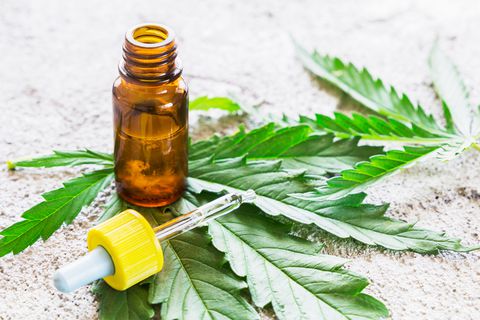Unsure of the uses and benefits of CBD oil – not to mention its legality? Cannabidiol is derived from the cannabis plant, and comes with a wealth of health benefits.

Cannabidiol (more commonly known as CBD) has experienced a surge in popularity in recent months, in part due to its availability in high-street health shops.
Previously viewed as an option only for the seriously ill, CBD oil is gaining traction among wellness fans, with its promise of being able to provide relief from everything from pain to depression and anxiety. But what exactly is it and are there any associated risks?
Is CBD the same as cannabis?
CBD is one of 104 chemical compounds, known as cannabinoids, that can be found in the cannabis plant. It’s a naturally occurring substance, which can be extracted and mixed with a carrier oil – often hemp seed or coconut – to create CBD oil.
Unlike the most well-known cannabinoid, tetrahydrocannabidiol (THC), CBD is not psychoactive, meaning that it won’t make you ‘high’ – the sensation most commonly associated with cannabis. It is, however, reported to offer a range of health and medicinal benefits – the reason behind its growing acclaim.
Is CBD oil legal?
There has been a fair amount of confusion surrounding the legality of CBD oil. But while the vast majority of cannabinoids are controlled substances under the Misuse of Drugs Act, rest assured that CBD oil is legal across the UK for medicinal purposes, provided it has been derived from an industrial hemp strain that is EU-approved. These strains contain very little to no THC (the psychoactive cannabinoid).
There are strict restrictions in place with regard to CBD oil’s THC content: for CBD oil to be legal in the UK, it must contain no more than 0.2 per cent THC, and the THC must not be easily separated from it.
How do you take CBD oil?
CBD oil is most readily available as a tincture. This can be taken by applying a few drops under your tongue, holding in your mouth for a few moments so it can be absorbed, before swallowing. It can also be added to water or smoothies. A spray form is available (simply spritz under your tongue), as are capsules, creams that can be applied topically, and e-liquid for vape pens.
When it comes to dosage, guidelines state you should start with the smallest possible dose and gradually build up – its effects should be immediate, so you will be able to tell if the lower dosage is working for you. However, it’s always best to consult your doctor before trialling any new medication or remedy.

What are the benefits of CBD oil?
While the majority of research done into the effects of CBD oil has been based on animal studies and anecdotal evidence, some pretty clear benefits have been highlighted:
CBD oil can alleviate pain and cancer-related symptoms
Many studies – both animal and human – have examined the link between CBD and pain relief, which are thought to be down to the oil’s ability to reduce inflammation and interact with neurotransmitters.
One study found that multiple sclerosis sufferers experience increased mobility, reduced muscle spasms and reduced pain when treated with a combination of CBD and THC for one month; while another study demonstrated CBD and THC improved pain management for those with rheumatoid arthritis.
What’s more, CBD has been found to alleviate symptoms associated with cancer treatment, including chemotherapy-induced nausea and vomiting.
CBD oil can ease anxiety
Several studies have found that the use of CBD oil is helpful in reducing anxiety, meaning it could be a beneficial natural remedy for sufferers. Back in 2011, a study published in the journal Neuropsychopharmacology found that when people with generalised social anxiety disorder (SAD) were given 600mg of CBD oil prior to a public speaking test, as opposed to a placebo, they experienced significantly less anxiety, difficulty and discomfort during their speech.
CBD oil is a natural antidepressant
Many studies have examined CBD oil’s antidepressant-like effects. It’s also been shown to safely improve the symptoms of post-traumatic stress disorder (PTSD) in children.
CBD oil could be beneficial in epilepsy treatment
Clinical trials have found CBD to be highly effective in the treatment of certain types of epilepsy. There is also growing evidence to suggest it could help more types, although further research is needed to fully understand safe and optimal dosing.

Can CBD oil treat acne?
Due to the effects of CBD oil on the immune system and its ability to help reduce inflammation, it may offer relief from acne. In fact, a study published in the Journal of Clinical Investigation found that CBD oil inhibited the production of sebum in the sebaceous glands in the skin.
Does CBD oil have any health risks?
While the majority of CBD oil users don’t experience any negative effects, as with any treatment – natural or otherwise – there are possible side effects. These include nausea, vomiting, diarrhoea, bloating and dizziness.
More seriously, a small percentage of users have had to discontinue with CBD oil due to suspected liver damage. As well as this, CBD oil could interact with common prescription medications, so it’s important you always seek the advice of your GP before giving it a go.
